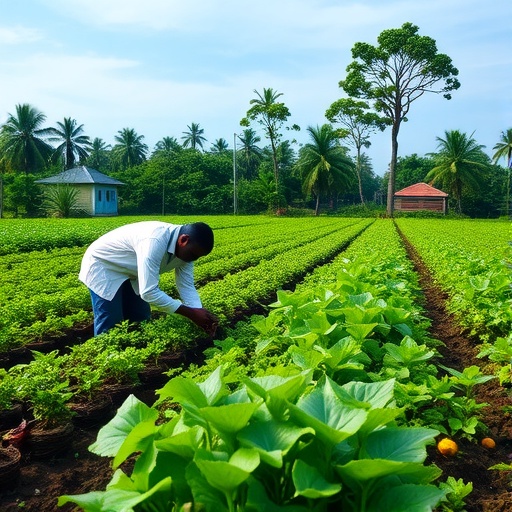In recent years, the landscape of agriculture has been dramatically transformed by technological advancements. Among these, financial technology (fintech) has emerged as a crucial player in redefining how farmers access financing, manage their resources, and ultimately enhance their productivity. In Bangladesh, a nation heavily reliant on agriculture for economic stability and growth, the integration of fintech solutions into the agricultural sector holds significant promise. A collaborative research effort spearheaded by Rana et al. aims to unravel the dynamics of fintech adoption within this context, utilizing the technology acceptance model as a framework for analysis.
The technology acceptance model (TAM) provides a robust foundation for understanding how and why individuals adopt new technologies. It emphasizes two primary factors: perceived ease of use and perceived usefulness. These elements are critical in determining a user’s intention to embrace technology. In Bangladesh, where traditional agricultural practices dominate, introducing fintech solutions requires a deep understanding of these perceptions among farmers. The research explores how these perceptions influence the willingness of farmers to integrate modern financial technologies into their operations.
As Bangladesh strives for sustainable agricultural development, fintech can provide critical support. The country’s farmers often face challenges related to access to credit and financial services. Traditional banking systems can be cumbersome and inaccessible, especially in rural areas. Fintech solutions, characterized by their mobile accessibility and user-friendly interfaces, have the potential to bridge this gap. By simplifying the loan application process and offering tailored financial products, fintech can empower farmers, enhance their autonomy, and ultimately drive agricultural productivity.
Rana et al. emphasize the importance of tailored fintech solutions that meet the unique needs of Bangladeshi farmers. For instance, developing micro-financing options that cater specifically to the cash flow cycles of agriculture can significantly improve financial inclusivity. Providing farmers with access to digital wallets, mobile banking, and peer-to-peer lending platforms can revolutionize their financial interactions. This transformation not only fosters a thriving agricultural sector but also contributes to broader economic growth and sustainability efforts in the nation.
The study also highlights the role of education in fostering fintech adoption among farmers in Bangladesh. Many farmers may lack familiarity with digital technologies, which can create resistance to adoption. The research indicates that comprehensive educational programs focused on the benefits of fintech, as well as training in digital literacy, are pivotal. By equipping farmers with the necessary skills and knowledge, the barriers to entry can be lowered, facilitating greater acceptance of these innovative solutions.
Moreover, the research delves into the socio-cultural factors influencing fintech adoption. Bangladesh’s diverse social fabric plays a crucial role in shaping the perceptions and behaviors of farmers towards technology. Understanding these cultural nuances is essential for fintech providers aiming to penetrate the agricultural market. For instance, community influence and the role of local cooperatives can either bolster or hinder the adoption process. Tailoring marketing strategies to resonate with local values and customs can significantly enhance the receptiveness of farmers toward fintech.
The economic implications of adopting fintech solutions extend beyond individual farmers; they impact the entire agricultural supply chain. Enhanced financial access can lead to increased investments in agricultural inputs, such as seeds and fertilizers, ultimately boosting crop yields. Furthermore, as farmers adopt digital financial practices, they contribute to the formalization of the agricultural economy. This formalization can lead to improved data collection and analytics, enabling policymakers to craft more effective agricultural policies and interventions.
While the potential benefits of fintech in agriculture are promising, the study does not shy away from discussing the challenges that may arise in its implementation. For instance, issues related to internet connectivity and digital literacy can pose significant hurdles. In rural Bangladesh, where infrastructure may be lacking, ensuring reliable access to online financial services is paramount. Therefore, collaborations between fintech companies, governmental bodies, and local organizations are essential to address these infrastructural limitations, ensuring that technology can reach and benefit the farmers who need it most.
Furthermore, security concerns surrounding fintech adoption cannot be overlooked. Farmers must feel confident that their financial data and transactions are secure from cyber threats. Building robust cybersecurity measures and educating farmers about safe digital practices will be crucial in fostering trust in fintech solutions. By addressing these concerns head-on, stakeholders can create an environment conducive to the widespread acceptance and use of financial technologies in agriculture.
As the research by Rana et al. suggests, the intersection of fintech and agriculture in Bangladesh is not merely a theoretical concept but a burgeoning reality that demands attention. The potential for fintech to revolutionize agricultural practices and contribute to sustainable development is vast. Policymakers, agricultural experts, and fintech innovators must come together to harness this potential, ensuring that farmers are equipped with the tools and knowledge they need to thrive in an increasingly digital world.
In conclusion, the findings from the study underscore the transformative potential of fintech in achieving sustainable agricultural development in Bangladesh. By applying the technology acceptance model, the research illuminates the perceptions that will guide farmer adoption of these innovations. As fintech solutions become more prevalent, their impact will resonate throughout the agricultural sector, paving the way for increased productivity, improved livelihoods, and enhanced economic resilience for farmers. The future of agriculture in Bangladesh is not just about traditional practices; it is increasingly about embracing technological advancements that can deliver sustainable solutions for generations to come.
Subject of Research: The adoption of financial technology for sustainable agricultural development in Bangladesh.
Article Title: Modeling the adoption of financial technology for sustainable agricultural development in Bangladesh using the technology acceptance model.
Article References:
Rana, M., Islam, M.T., Abdelwaheb, S. et al. Modeling the adoption of financial technology for sustainable agricultural development in Bangladesh using the technology acceptance model. Discov Sustain 6, 1191 (2025). https://doi.org/10.1007/s43621-025-02000-3
Image Credits: AI Generated
DOI: https://doi.org/10.1007/s43621-025-02000-3
Keywords: fintech, agriculture, Bangladesh, technology adoption, sustainable development, technology acceptance model.




